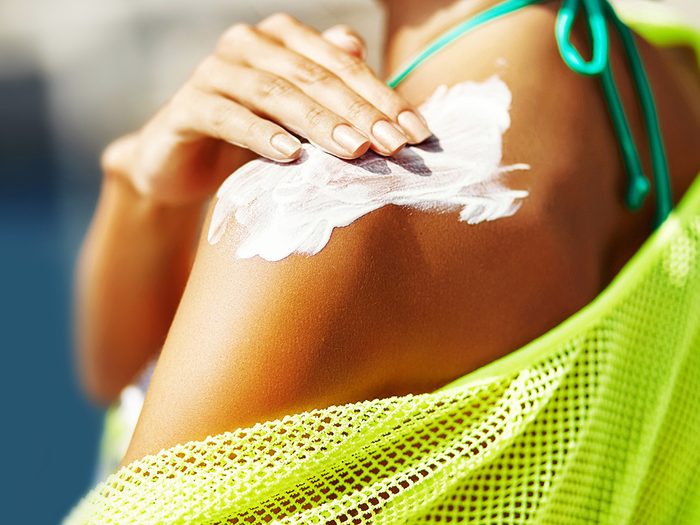
What is mineral sunscreen?
According to the Canadian Cancer Society, 8,000 Canadians will be diagnosed with melanoma skin cancer in 2020, and 1,300 will die from the condition. Since ultraviolet radiation is the biggest cause of melanoma, the use of sunscreen to filter UV rays has become a daily necessity, not unlike brushing your teeth or eating your veggies, says Victoria-based dermatologist Dr. Mark Lupin.
But what kind of sunscreen should you use? Conventional chemical sunscreens used to be top dog in the sun-care market because they were lighter, smoother and absorbed right into the skin. All that has changed with the next generation of mineral sunscreen (sometimes referred to as “physical sunscreen”), which “reflects rather than absorbs ultraviolet radiation,” says Dr. Lupin. With new and improved formulas, both niche and mass-market skin-care brands are jumping on the mineral sunscreen bandwagon. Here are some of your best bets, along with six compelling reasons why it’s time to give mineral sunscreen a shot.
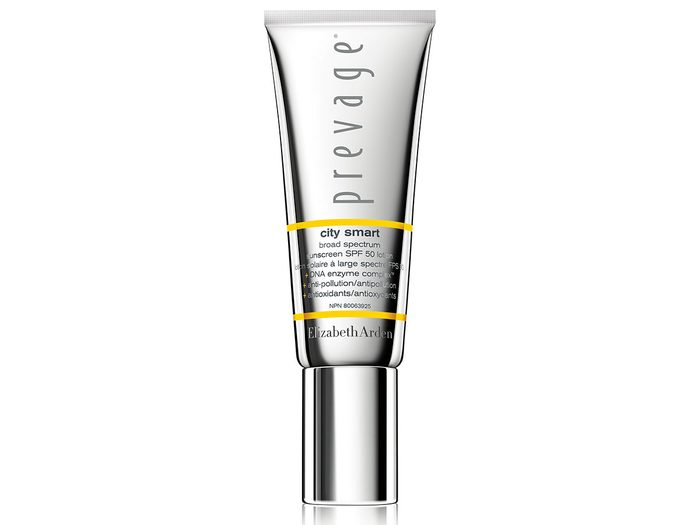
Mineral sunscreen provides protection against the full spectrum of ultraviolet radiation.
Chemical sunscreens contain filters that protect against UVB radiation, the type of wavelength that damages the superficial layers of the skin and causes sunburns. Luckily, mineral sunscreens with both zinc oxide and titanium dioxide protect against UVA as well, which is the wavelength that penetrates clouds and glass and causes significant photo-aging in the form of wrinkles and sun spots. When picking up a bottle of mineral sunscreen, look for the words “full spectrum” or “broad spectrum.” This label means that the product screens both UVB and UVA radiation. Make sure you choose a minimum of SPF 30.
Product pick: Not only does Elizabeth Arden’s Prevage City Smart Lotion contain micronized zinc oxide and titanium dioxide, but it also has an Anti-Pollution Complex that uses antioxidants to improve signs of aging and prevent future damage. Elizabeth Arden Prevage City Smart Broad Spectrum SPF 50 Lotion, $88, Hudson’s Bay.
Considering a detox of your entire grooming routine? Find out what it’s like switching to natural deodorant.
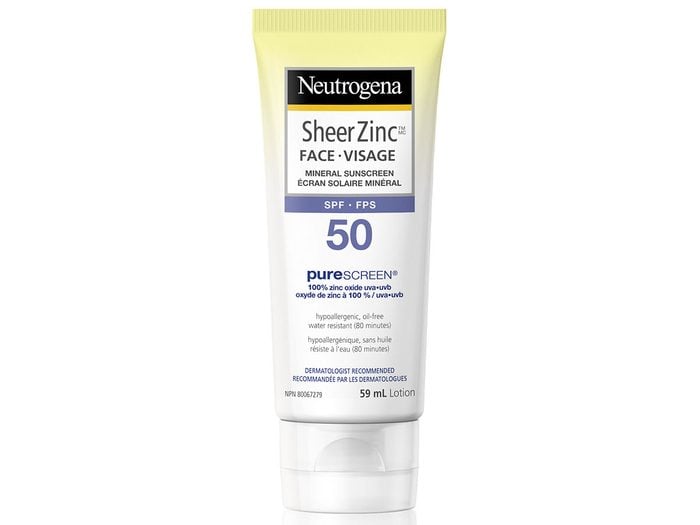
Mineral sunscreen is less likely to irritate sensitive skin.
Mineral sunscreens are generally well-tolerated by sensitive skin because their ingredients aren’t absorbed into the skin itself. Instead, the physical filters in mineral sunscreens sit on the surface of the skin and act as a screen that deflects UV radiation. Chemical sunscreens, on the other hand, can cause photo-allergic contact dermatitis because their ingredients penetrate the epidermis.
Product pick: Neutrogena’s Sheer Zinc lotion has Purescreen Technology that is formulated to be gentle on sensitive skin. The lotion is also hypoallergenic and avoids irritants such as fragrance, parabens, phthalates and dyes. Sheer Zinc Face Mineral Sunscreen SPF 50 Face Lotion, $19.99, Neutrogena.
Forget to reapply after you were in the water? These home remedies for a sunburn can help relieve the pain and discomfort.
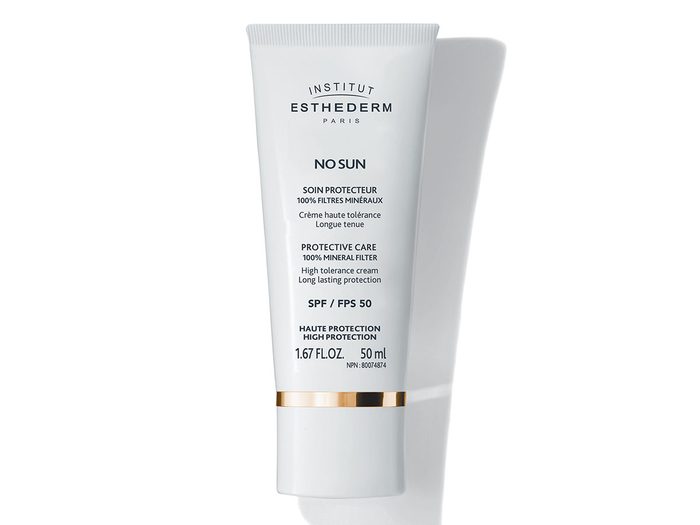
Mineral sunscreen starts protecting your skin immediately after application.
Since chemical sunscreens need to be absorbed into the skin, they take 20 to 30 minutes to begin working. That means you need to stay inside after application until the sunscreen becomes effective or you’ll risk sunburn and photo-aging. Mineral sunscreens, on the other hand, protect the skin by physically screening the sun’s rays, which means they’re effective as soon as they’re applied.
Product pick: Sun-sensitive? Esthederm’s No Sun cream is specially formulated to protect people who experience rashes and irritation when they go out in the sun. It contains soothing ingredients and cellular water to reduce the loss of water and minerals that can occur during sun exposure. No Sun 100% Mineral Screen Protective Care, $55, Esthederm.
Make sure you’re aware of these common skin cancer myths.
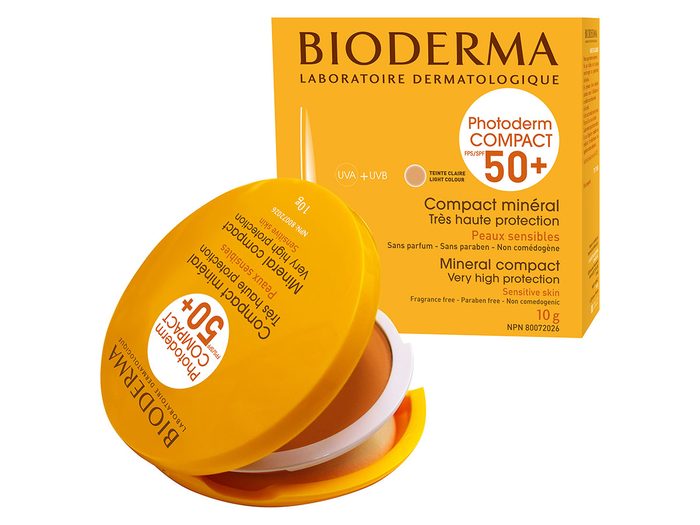
Some mineral sunscreen formulations can be reapplied over makeup.
For optimal effectiveness, sunscreen needs to be applied every two to four hours, which is a total pain if you’re in the middle of your workday and wearing a full face of makeup. That’s where mineral sunscreen compacts or powders come in handy. These products can be applied over foundation without ruining a flawless face and are the perfect option for reapplication over lunch hour.
Product pick: Available in two different shades to blend with most skin tones, Bioderma’s Mineral Compact formula leaves a powdery finish—a perk during the sweaty days of summer. Photoderm Mineral Compact SPF 50+, $29.50, London Drugs.
Find out 10 sunglasses myths that could be harming your eyes.

Mineral sunscreen can be just as invisible as conventional chemical sunscreen.
If mineral sunscreen conjures up images of gangly teenage lifeguards with their noses slathered in a white streak of zinc, think again. “Mineral sunscreens have improved a lot over the years,” says Dr. Lupin. “They’ve evolved from white, pasty, heavy sunscreens to refined, micronized formulations that are clear and beautiful on the skin.” Instead of leaving a white cast, many versions are actually tinted, which means you may even need less foundation and concealer than normal.
Check out more tips for healthy skin that naturally glows.

Mineral sunscreens are less likely to exacerbate acne than chemical sunscreens.
Many people with acne or blemishes avoid sunscreen for fear of aggravating their conditions. This isn’t without basis in fact, as chemical sunscreens can indeed exacerbate breakouts, while mineral formulas can sink into pores and cause pimples. To avoid this issue, look for the word “non-comedogenic” on your mineral sunscreen. (It’s code for “won’t cause comedones”—medical speak for “clogged pores.”)
Next, find out the skin changes you should never ignore.